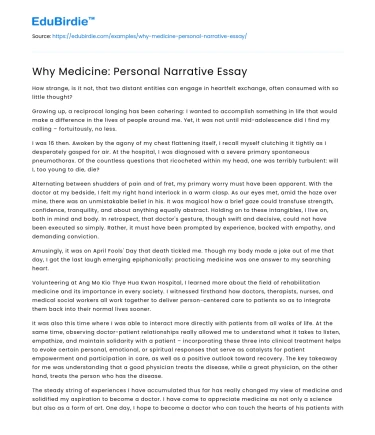How strange, is it not, that two distant entities can engage in heartfelt exchange, often consumed with so little thought?
Growing up, a reciprocal longing has been cohering: I wanted to accomplish something in life that would make a difference in the lives of people around me. Yet, it was not until mid-adolescence did I find my calling – fortuitously, no less.
Save your time!
We can take care of your essay
- Proper editing and formatting
- Free revision, title page, and bibliography
- Flexible prices and money-back guarantee
I was 16 then. Awoken by the agony of my chest flattening itself, I recall myself clutching it tightly as I desperately gasped for air. At the hospital, I was diagnosed with a severe primary spontaneous pneumothorax. Of the countless questions that ricocheted within my head, one was terribly turbulent: will I, too young to die, die?
Alternating between shudders of pain and of fret, my primary worry must have been apparent. With the doctor at my bedside, I felt my right hand interlock in a warm clasp. As our eyes met, amid the haze over mine, there was an unmistakable belief in his. It was magical how a brief gaze could transfuse strength, confidence, tranquility, and about anything equally abstract. Holding on to these intangibles, I live on, both in mind and body. In retrospect, that doctor's gesture, though swift and decisive, could not have been executed so simply. Rather, it must have been prompted by experience, backed with empathy, and demanding conviction.
Amusingly, it was on April Fools' Day that death tickled me. Though my body made a joke out of me that day, I got the last laugh emerging epiphanically: practicing medicine was one answer to my searching heart.
Volunteering at Ang Mo Kio Thye Hua Kwan Hospital, I learned more about the field of rehabilitation medicine and its importance in every society. I witnessed firsthand how doctors, therapists, nurses, and medical social workers all work together to deliver person-centered care to patients so as to integrate them back into their normal lives sooner.
It was also this time where I was able to interact more directly with patients from all walks of life. At the same time, observing doctor-patient relationships really allowed me to understand what it takes to listen, empathize, and maintain solidarity with a patient – incorporating these three into clinical treatment helps to evoke certain personal, emotional, or spiritual responses that serve as catalysts for patient empowerment and participation in care, as well as a positive outlook toward recovery. The key takeaway for me was understanding that a good physician treats the disease, while a great physician, on the other hand, treats the person who has the disease.
The steady string of experiences I have accumulated thus far has really changed my view of medicine and solidified my aspiration to become a doctor. I have come to appreciate medicine as not only a science but also as a form of art. One day, I hope to become a doctor who can touch the hearts of his patients with his dedication, his compassion, and eventually, his art.






 Stuck on your essay?
Stuck on your essay?

